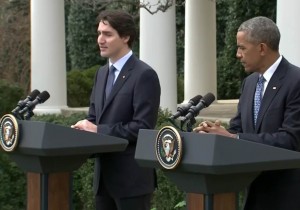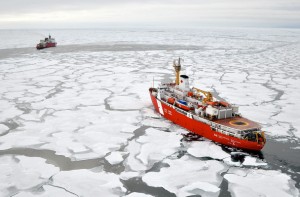
When a U.S. president and a Canadian prime minister meet, it’s not a given that the Arctic will be on the agenda. But this morning, on Prime Minister Justin Trudeau’s first official visit to Washington, D.C. the two leaders released an agreement on the Arctic, energy and climate. Alaska’s senators aren’t happy with it.
The Arctic portion of the agreement calls for a “new partnership” to build an economy that protects the environment. In a White House press conference, Trudeau said the partnership foresees science-based standards for various Arctic activities.
“From fishing in the high seas of the Arctic, as well as set new standards to ensure maritime transport with less emissions, the partnership will also support sustainable development in the region,” Trudeau said before the session was opened to questions from reporters.
The Arctic statement says both countries “reaffirm” their national goals of protecting at least 17% of land and 10% of marine areas by 2020. And, it says, they will also lead an effort to persuade the other northern nations to develop a pan-Arctic network of marine protected areas.
“Look, I think any time the Arctic is prominently featured in a press conference, that’s important,” said Heather

Conley, an Arctic expert at the Center for Strategic and International Studies. But she says the Arctic didn’t take top billing in the agreement. “It’s obviously a great day to celebrate a very close relationship. Phenomenal that Arctic was so prominently featured, but understanding that this is primarily a climate change perspective.”
Among other details, the two leaders are also pledging to work together to establish low-impact shipping corridors. In the energy and climate portions of the agreement, they agreed to reduce methane emissions from their oil and gas industries by at least 40 percent by 2025, and end routine gas flaring.
Environmental groups promptly lauded the agreement.
Gov. Bill Walker said he was disappointed Alaskans weren’t consulted in crafting it.
“The Arctic presents great opportunity for our state and our nation to prosper in a global economy,” Walker said in a written statement. “However, the way to achieve that is by greater federal investment in our state’s Arctic development efforts, and not the restrictive policies that were presented today.”
Sen. Dan Sullivan says he and Sen. Lisa Murkowski couldn’t get information about the agreement until a briefing two days prior. Sullivan says they even tried contacting the Canadian Embassy, because no one from the U.S. government was returning their emails.
“The president and the secretary of State are making commitments on the Arctic. What are they doing? They’re making commitments about the Alaska,” Sullivan said, before he and other senators met with Trudeau at the Capitol. “That’s the Arctic.We’re an Arctic nation only because of Alaska. And they’re making these big commitments. And not one of them reached out to us. And not one of them asked us what we thought. Not one of them was seeking input from us.”
Sullivan says the agreement promises what he calls “legally suspect” oil and gas regulations and is often vague.
“But on protecting and locking up the oceans, what does that mean?” the senator asked. “And has anyone in Alaska been consulted on it?”
(Conley says the U.S. has been pursuing the goal of marine protected areas through the Arctic Council.)
Sen. Murkowski, in her own statement, says the agreement seems to give Canada a partial veto of development decisions in Alaska. Her spokesman pointed to a sentence that says if Arctic oil and gas activity proceeds, it must align with “science-based standards between the two nations” that ensure operators are prepared for Arctic conditions.
Neither Alaskan was among the border-state senators invited to the State dinner at the White House. The guest list includes prominent Canadians in entertainment, such as “Saturday Night Live” producer Lorne Michaels, and actors Sandra Oh, Mike Myers and Michael J. Fox, as well as Trudeau’s mother, Margaret Trudeau, and his in-laws. Alaska was represented on the menu, with halibut “casseroles” as the first course.
Liz Ruskin is the Washington, D.C., correspondent at Alaska Public Media. Reach her at lruskin@alaskapublic.org. Read more about Liz here.





